- Home
- L. M. Montgomery
A Name for Herself Page 19
A Name for Herself Read online
Page 19
“Here’s a letter from myself at twelve to myself at sixteen. No, I won’t let you see it either. You might print it in the Echo. It’s a curiosity of literature.
“Dear me, what are all these buttons – four of them and all different?”
“They have a masculine look,” I said maliciously. “I should say they had come off somebody’s coat.”
Theo brightened up.
“Oh, yes, to be sure. How stupid of me. That big spotty one came off Harold’s coat. And that black one was Jim’s. I forget whose the other two were. Here’s a lot of verses Harry wrote to me before we quarreled. They’re very sentimental and the rhymes don’t stand squarely on their feet. Still I thought them very fine at the time. Here’s a piece of Kitty Scott’s wedding dress, and here’s my first ball programme. What a jolly time I did have. Just look. Tom’s name is in six places.199 Wasn’t that dreadful. I wore pale yellow and everybody said I looked heavenly. Dear me, whose hair is this? It must be Howard’s. He is the only one I remember having curly black hair like that. This envelope has a lot of faded roses in it. I wore them at the dance before Jerry went away. Look at these old school compositions – and an old New Year list of resolutions – and here’s another bundle of old letters.”
Theodosia became absorbed in reading them, and I lazily reflected what fools we mortals be200 and wondered if I had as much rubbish as that in my box up in the garret. If I have I must hunt it out some day and burn it … if I have the heart to do so. We prize some of the things in those old boxes very dearly, don’t we?
“That Miss B. we met at the M———s has an imaginative temperament,” said Marian the other evening. “She is affectionate and demonstrative but obstinate to a fault.”
“How do you know?” I queried.
“She uses lily-of-the-valley perfume,” returned Marian. “You can tell people’s characters by their favorite perfume just as well as by their walk. Dorothy A—— is warm-hearted and imaginative, and inclined to extravagance and treats life flippantly – she likes rose perfume. Heliotrope is Gwennie’s pet: even if I didn’t know her I could tell that she was dainty, neat, and demure, hating fuss or notoriety. Constance B—— is religious, affectionate and peace-loving. Connie always keeps Lent strictly.201 She affects violet perfume. Yes, I always judge people by the perfume they use.”
I was silent from horror. Before coming downstairs I had by mistake scented my hanky with some certain “loud” perfume that Ted keeps to look at. What on earth would Marian think of me?
“Mr. A.,” said Polly the other evening, “guess how much I paid for these new furs.”
Mr. A. looked wise. He was probably thinking something like this:
“No doubt she has purchased them at some wrecked goods sale for a mere song so, though I don’t know a thing about furs I’ll make it low enough to get the credit of being a good guesser.”
“Forty dollars,” he said.
“Mr. B.,” said Polly calmly, “it’s your turn to guess.”
Mr. B. is a young man wise in his generation. I knew perfectly well that he had no idea whether Polly’s furs were muskrat or Russian sable, but he said, without turning a hair:
“Five hundred dollars.”
“That’s a better guess than Mr. A.’s anyhow,” said Polly looking resentfully at poor A. “They cost seventy-five dollars.”
[Spring and Smiles and Old Maids]
Monday, 10 March 1902
SOMEWHERE OR OTHER SPRING IS ON HER WAY TO US. WE had a few days last week that were her heralds and were they not charming? The staleness and monotony of the dull winter days seemed blotted from our recollection in the exhilarating breath of the coming spring – the golden days of the world’s renewed youth.
To be sure, there are cold days and tingling fingers and perhaps snow flurries before us yet. But we know that the sceptre of winter is broken and that it is merely a question of a few weeks before the buds on the trees will be swelling, moist with promise of leaf and blossom, and the grasses and ferns poking up their dear green heads along the driveways in the Park.
Some people complain of our long, lingering northern springs, but for me there is an inexpressible charm in the slow, gradual awakening of all the world beneath the sunlight. I like to watch the trees turning from their silvery gray to misty purple and then to tender green. I like to watch the long snow wreaths dwindling along the edges of the woods from day to day, the mellow tones creeping into the pearly horizons, and the grass growing ever greener and greener in sheltered places. There will always be something worth living for as long as there are springs.
To be sure, there is mud – and housecleaning! But what would you? The first Eden of all had its serpent.
A saunter down Barrington street would tell you that spring was coming if nothing else did. How the shops are blossoming out in “spring goods” – muslins and laces and silks galore. The millinery windows are abloom with hats especially the ever-useful and perennial “sailors.” And, if every other sign failed, I would still know that spring was a-near, because Polly is up to her eyes already in patterns. There will be no peace or rest in our household from now until her spring outfit is completed.
But isn’t it jolly when you discard furs and winter garments for the first time and sally forth in spring attire? Don’t you feel as if you had been made over new?
“I liked her smile,” said Ted, one day, apropos of a new acquaintance we were discussing.
His remark set me thinking about the different kinds of smiles there are in the world. There are smiles and smiles. Can’t you classify all your friends by their own particular and private smiles?
I have in mind a friend who has the most delightful smile in the world. It always puts me in good humor just to see it. There are dimples in it and lots of other things that go to make smiles beautiful, but it is not on their account I like it. It is because of the real friendliness it expresses. You feel that she is smiling at you because she likes you and not because she just thinks it is her duty to do so. It is not too broad a smile – it lingers round her lips and peeps out of her eyes and irradiates her whole face. I always feel good for hours after I’ve met her.
Then there is the sarcastic smile. Isn’t it terrible? I can endure sarcastic tones and even bear up bravely under sarcastic words. But the sarcastic smile shrivels me right up, mentally and physically. There is the “made-to-order” smile which is awful. People put it on when they think they ought to be glad to see you but are not. It always makes me think they must have the toothache. There is the “nervous” smile, which folks assume to hide their nervousness. That one always wants to make me scream. There is the condescending smile that makes your very soul creep. There is the sympathetic smile that warms the cockles of your heart. There is the jolly, comradey smile that brightens the world up for you.202 And there are dozens of others.
The Kaiser has instituted a campaign against rats.203 Nice man! Now, if he or some other of the powers that be would only exterminate mice the thanks of grateful womanhood would be his forever.
Just think. A world without any mice in it! Why, life would be worth living.
Do you know that the amount of clover grown in any place is in direct proportion to the number of old maids living there? Well, it’s true; no less a person than Darwin proves it.204 Listen. The clover crop depends on the number of bumble bees that visit it, they being the only insects whose tongues can reach down into the clover blossoms and so fertilize them. But field mice eat bumble bees. Cats eat field mice. Old maids keep cats. So, the more old maids the more cats, the more cats the fewer field mice, the fewer field mice the more bumble bees, the more bumble bees the better clover crop. Isn’t logic a beautiful thing?
“It was dreadfully pretty,” sighed Polly. She was referring to a muslin shirtwaist she had seen in an uptown store.
Ted reached across the table and coughed.
“The mud on the streets today was divinely abominable,” he remarked calmly.
Polly looked queer and Theodosia queerer. Ted remained calm. I bent towards him anxiously.
“You don’t think the recent sudden changes in temperature have affected your brain, do you, Teddy-boy?” I asked sympathetically.
“Oh, no,” said Ted, cheerfully. “I’m feeling a little weary, that’s all. This has been such a superbly tiresome day.”
Polly colored and looked out of the corner of her eyes at Theo and me to see how we were taking it.
“Tired as I am,” went on Ted, “I suppose I must go and hear Captain Bernier lecture on the Pole tonight.205 They say it’s horribly interesting. Cynthia, pass me the cheese, please. This meat is so exquisitely tough that I really can’t eat it.”
I passed the cheese and, like Brer Rabbit of immortal fame, “laid low and said nothing.”206 Polly looked cross and Theodosia seemed bursting with some suppressed amusement. Ted hasn’t had an outbreak since. But what do you suppose he meant?
[Old Houses and Parlour Games]
Monday, 17 March 1902
YOU SHOULD HEAR POLLY GROANING OVER WHAT SHE calls her “March complexion.” As a rule, Polly has a very good complexion, clear and creamy with a dash of ripe tinting in the cheeks when the blood shows through. But nowadays when she comes in from an outdoor walk she does look funny.
Her face is spotted with red and there are patches of color on her forehead that look as if they had rusted there. They make our Polly look as if she had the jaundice.
Everybody who has ever studied the second primer207 knows that the March winds do blow.208 And very trying to the soul of femininity are those same stinging, unkind winds. Polly is wasting her substance on cold creams and Theodosia and I are trying to look as if we didn’t mind a little thing like that – but deep down in our souls we do!
The last time Theo and I were out in the country we came across a deserted old house in our rambles. I improved the occasion to moralize a bit. An old deserted house always makes me feel that way. There is always something so mournful and pathetic about it as if it were grieving for its lost joys and long-silent songs.
Everything about this old house seemed written over by the fingers of the past. It was the ghost of a dead home staring out of its broken windows hollowly and sadly. The rooms were empty and desolate, tenanted only by scampering squirrels or fugitive mice where once children’s feet had pattered and childish laughter had echoed. Once those lonely dim old rooms had known life. There had been wooings and weddings, births and deaths, partings and reunions there. Scores of feet had passed over its crumbling threshold, some strong and eager, some feeble and halting. Song and laughter had echoed through it.
Now it was worn-out and deserted. The father and mother were sleeping in the little hillside burying ground and the children were all far away, busy men and women of the working world. An old lilac tree, purple with blossom, swung before the empty parlor window. A red rose, planted by dead hands, bloomed at the mossy sagging doorstep. The wind sighed and moaned softly in the gnarled old apple trees around it.
“Oh, come away, Cynthia,” said Theodosia with a shiver. “It’s like something dead – it’s a ghost.”
I have great love for old homesteads – old houses which have sheltered three or four generations and cradled joy and sorrow until one has a fancy that their very walls must be permeated with the essences of the lives and loves that have glowed between them, and give it out again as a benediction on their inmates. An old homestead, ripened and mellowed by humanity for over half a century, is a truly beautiful thing.
The other evening Polly was invited to a party given by Master Algie B—— to his young friends. He wanted Polly to help him entertain.
“You’re so jolly,” he said, frankly, “and always have some good ideas for fun and – and – keep things stirred up, you know.”
From the various accounts I have heard of that party and the reckless hilarity which reigned in the house of B—— while it was in progress I should judge that Polly fully succeeded in “keeping things stirred up.”
This is one of her fun-raising devices:
All the boys were lined up in a row, each holding his left foot behind his back in his right hand and grasping his right ear with his left hand. Polly then spread newspapers on boxes about six inches from the floor at the other side of the room. The boys had to hop towards them and endeavor to lift them with their teeth. Properly performed this is guaranteed to be productive of something funny.
At our house the other night we were playing the old game of “mental photographs.” Several of our friends were in and we got considerable amusement out of it. A list of questions is drawn up and are supposed to be answered truthfully – or at least as truthfully as your conscience will permit.
Out of the lot Ted’s and Polly’s were the most amusing, Ted’s because he made it so of malice aforethought, Polly’s because it was so naive and jumbled up. Here they both are, Polly’s first as due to courtesy:
Who are your favorite prose authors?
The Duchess and Sienkiewicz.209
Favorite painters? Rembrandt and Millais.210
Composers? Wagner and Sousa.211
Book? Anderson’s Fairy Tales.212
Play? Merchant of Venice.213
Your favorite heroes of fiction? Ivanhoe and Lancelot.214
Your favorite heroine? Little Eva and Becky Sharp.215
Your favorite hero in real life? Lord Roberts.216
Your favorite heroine in real life? Clara Barton.217
What do you enjoy most? Eating caramels.
What do you detest most? Getting the skirt of my dress muddy.
At what historic event would you most like to have been present? The execution of Mary Queen of Scots.218
What quality in men do you admire most? Their admiration.
What quality in women? Gumption.
Where would you like to live? In Halifax of course.
What is your ideal state of happiness? A new novel, a cosy corner and chocolate caramels.
What is your favorite occupation? Fancy work.
What gift of nature do you desire most? A straight nose.
What is your motto? Have a good time as you go along.
Ted’s is, I regret to say, flippant. Here it is:
Favorite prose author? Old Subscriber and Vox Populi.219
Poets? Anon. and Ibid.220
Painters? I don’t like to give the ladies’ names.
Composer – Cynthia’s cat.
Favorite Book? The dictionary.
Favorite Play? The V trick.221
Favorite hero of fiction? Santa Claus.
Favorite heroine of fiction? Betsy Prig.222
Favorite hero of real life? Hobson.223
Favorite heroine of real life? A good cook.
What I enjoy most? Getting photographed.
What I detest most? Looking at the results.
The historic event at which I would have liked to be present?
The interview of Eve with the serpent.
Quality in men I admire most? Ability to sit opposite a mirror at dinner and not look in it.
Quality in women? Sense of humor.
Where I would like to live? Wherever she is.
Ideal state of happiness? A cold night, a hot fire and taters in the ashes.
Favorite occupation? Watching someone else work.
Gift of nature I most desire? The gift of the gab.
Motto? Remember there are others.
[The Virtues of Laziness]
Monday, 24 March 1902
OH, I SHALL NEVER AGAIN SAY I LIKE A RAINY DAY! Wasn’t last week horrible? Gr-r-r-u! I had been dreaming such sweet little dreams of spring blossoms and birds and songs – and I was rudely awakened to the bitter realization that I must wade around in overshoes and raincloak and carry an umbrella in the teeth of a furious wind.
By the way, isn’t it harrowing to have your umbrella turn inside out? That is one of the times I feel convinced of the total depravity of inanima
te things.224
But this is not an argument against a bit of day-dreaming. It’s a good thing after all, if indulged in with moderation. It lifts us out of our little everyday ruts and gives us a jaunt through the realms of fairyland and our castles in Spain.225 We can escape from ourselves in it and that is also wise, now and then. Yes, I shall go on dreaming. But I will also get my umbrella mended and invest in a rainy-day skirt.
Next Sunday is Easter. Have you got your new hat. Polly has – she discovered it at one of the millinery openings last week and declares that it is a “dream” and a “vision” and “perfectly divine.” I feel that it is my duty to lecture her on her frivolity and tell her that she should think more of the real meaning of the Eastertide and less of the pomps and vanities of the world,226 as symbolized by new hats.
But there! I might as well talk to empty air.
All the time my little preachment is going on Polly is looking at her hat from fifteen different points of view in the mirror and at the end she turns to me and demands anxiously:
“Cynthia, don’t you think it is more becoming when I wear it tilted just a little bit over my left eye – so?”
Theodosia is freckling over the bridge of her nose. She is wild about it. She laughed at Polly’s windburn last week and this is her punishment. I told her never to mind, freckles were only “the kisses of Apollo,”227 and “beauty-spots,” but Theo acridly retorted that she never liked being kissed on the nose and that they jested at scars who never felt a wound.228 So I stopped trying to cheer her up – why is it people always resent being cheered up? – and advised lemon juice.

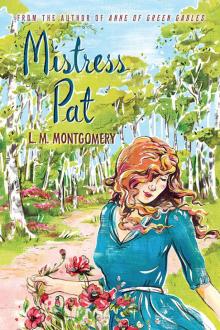 Mistress Pat
Mistress Pat A Tangled Web
A Tangled Web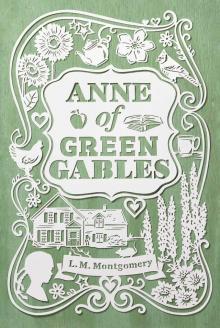 Anne of Green Gables
Anne of Green Gables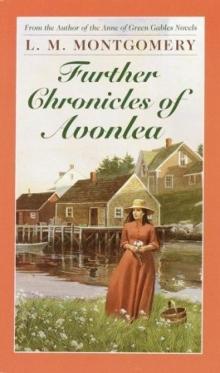 Further Chronicles of Avonlea
Further Chronicles of Avonlea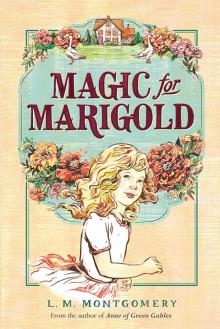 Magic for Marigold
Magic for Marigold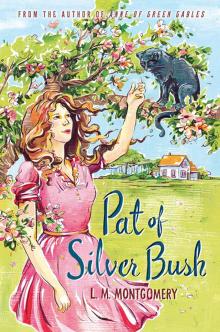 Pat of Silver Bush
Pat of Silver Bush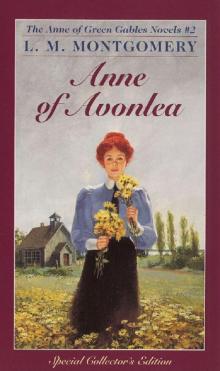 Anne of Avonlea
Anne of Avonlea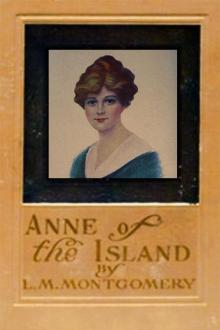 Anne of the Island
Anne of the Island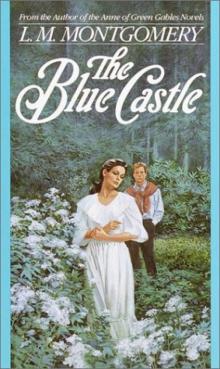 The Blue Castle
The Blue Castle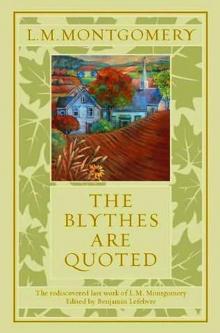 The Blythes Are Quoted
The Blythes Are Quoted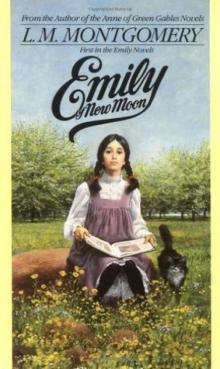 Emily of New Moon
Emily of New Moon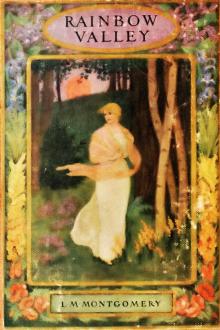 Rainbow Valley
Rainbow Valley Rilla of Ingleside
Rilla of Ingleside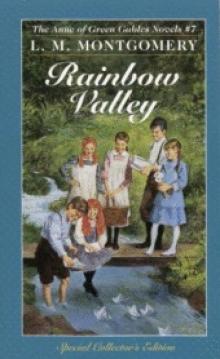 07 - Rainbow Valley
07 - Rainbow Valley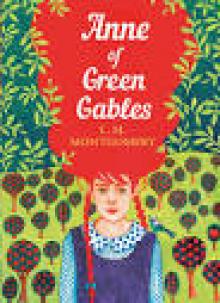 Anne of Green Gables (Penguin)
Anne of Green Gables (Penguin)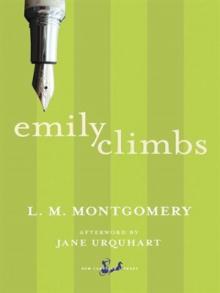 Emily Climbs
Emily Climbs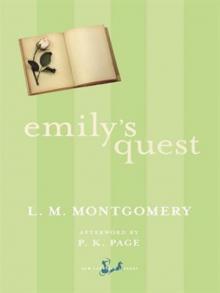 Emily's Quest
Emily's Quest A Name for Herself
A Name for Herself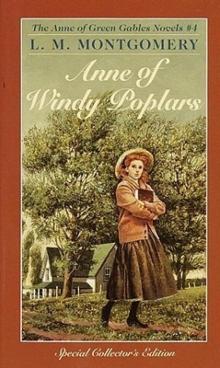 Anne of Windy Poplars
Anne of Windy Poplars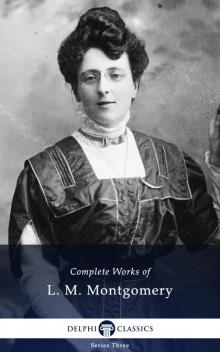 The Complete Works of L M Montgomery
The Complete Works of L M Montgomery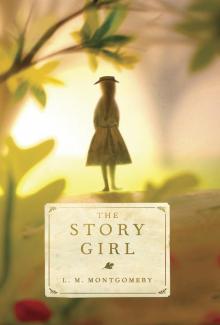 The Story Girl
The Story Girl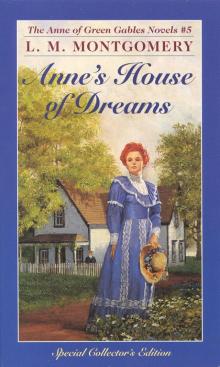 Anne's House of Dreams
Anne's House of Dreams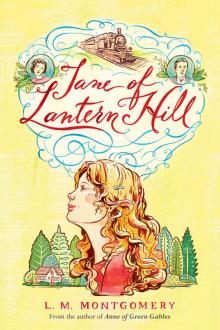 Jane of Lantern Hill
Jane of Lantern Hill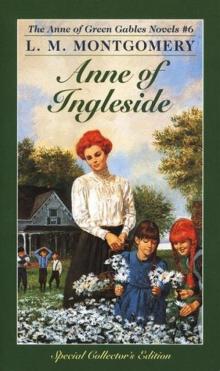 Anne of Ingleside
Anne of Ingleside